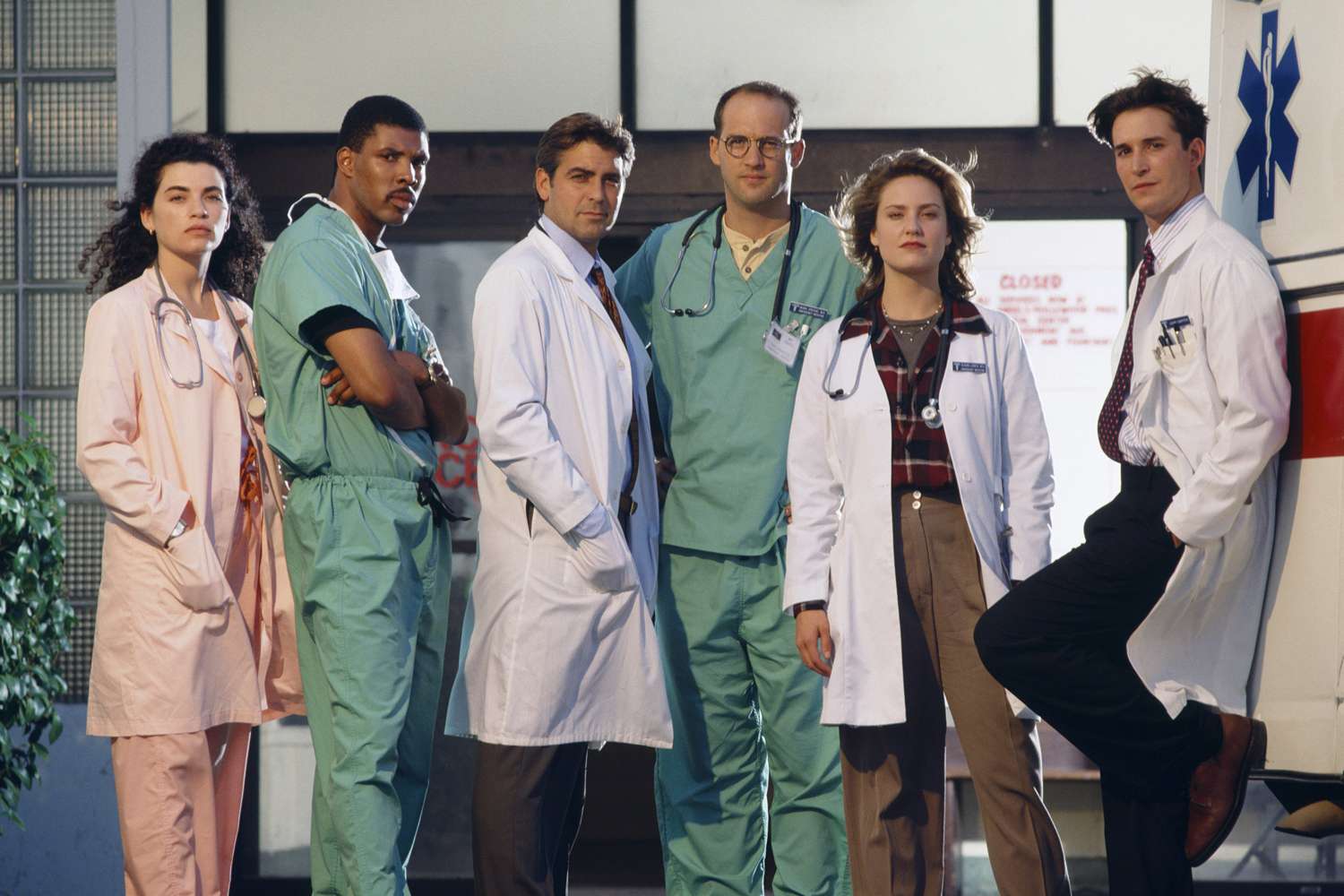ER Premiered 30 Years Ago Today: Major Moments You Forgot from the Pilot (Including George Clooney’s Charm)

On Sept. 19, 1994, the first episode of ER premiered on NBC, launching one of the most popular and influential network TV dramas of the ’90s. Critics praised the episode for its unprecedented realism and breakneck pace, and it earned series creator Michael Crichton and director Rob Holcomb Emmy nominations the following year.
“24 Hours,” which is available to stream on Hulu, Disney+, Max and other platforms along with all 15 seasons of ER, remains as compelling today as it was 30 years ago. The 87-minute episode does exactly what its title implies, tracking the goings-on in the emergency room of the fictional County General Hospital in Chicago over the course of 24 hours and introducing us to doctors Mark Greene (Anthony Edwards), Doug Ross (George Clooney), Susan Lewis (Sherry Stringfield) and Peter Benton (Eriq La Salle) along with medical student John Carter (Noah Wyle) and head nurse Carol Hathaway (Julianna Margulies).
Viewed on its own, it’s striking how much more “24 Hours” plays like a short film than the first episode of an ongoing drama. Its focus on a single day gives us a snapshot of Greene, Ross and co.’s day-to-day, while never leaving the ER. But unlike most pilot episodes today, it doesn’t establish much in the way of ongoing storylines, instead establishing its characters’ personalities and the tone of the series.

One notable exception is Hathaway’s side plot. Margulies’s character is established as the ER’s warm but tough head nurse. She’s well-liked by her coworkers and seems to have a flirtatious history with Clooney’s Dr. Ross. About an hour into the episode, after her shift ends, Hathaway is rushed back to the ER having overdosed in an apparent suicide attempt. She spends the rest of the episode in a coma, and her coworkers are baffled and shaken, having had no idea that she was struggling.
In hindsight, we know that Hathaway survives and goes on to become a lead character in the series, and that the aftermath of her suicide attempt will impact both her and her colleagues in episodes to come. But viewed on its own, simply in the context of the pilot, the subplot is a little confounding. Margulies’s character was originally intended to die off-screen between the pilot and the second episode, so it’s odd to imagine a version of the show that moves on without further addressing what lead her to attempted suicide.

Hathaway’s is just one of many medical emergencies we see in “24 Hours.” In fact, the episode really churns through patients in a way that would be unfamiliar to viewers of the many medical dramas that came after ER. There’s the kid who swallowed him mom’s house key; the distraught guy with lung cancer; the even more distraught guy who is convinced he has cancer despite Greene assuring him he doesn’t; the woman who went into labor in a cab; the teen with the ectopic pregnancy; the baby who “fell out of his crib”; the young woman who sloshed boiling water on her thighs; the young woman who totaled her father’s new Cadillac.
Any of these would likely have been fleshed out into a solid B or C plot in shows like Grey’s Anatomy, House or New Amsterdam, illuminating either topical issues or reflecting whatever might be going on in the lives of the show’s main characters. For instance, in one scene Wiley’s Carter struggles to insert an IV while his patient, a cop (Troy Evans) who accidentally shot himself in the leg, rants about beating his wife. In a contemporary series — or even a later episode of ER — it’s easy to imagine Carter and his colleagues taking the man seriously and dealing with what seems like evidence of an abusive marriage. Similarly, a hospital drama in 2024 would likely have seen Greene grappling with his own unconscious bias and the ways in which Black patients are routinely treated differently by medical professionals after an older Black man (Paul Benjamin) accuses him of not taking his complaints of seeing double seriously.

Then, of course, there’s the Clooney of it all. The actor’s role in the pilot is worth noting, considering he was the first cast member to sign on to the show and would go on to become ER’s biggest breakout star.
Edwards’s Greene is arguably the episode’s main character. It opens and closes on him, and his decision to remain an ER doctor rather than taking a cushy job with a private clinic is the main throughline. Clooney, meanwhile, is … Well, he’s Clooney: swaggering about, being charming and handsome and a little louche. Even in 1994, his charisma was undeniable, and the chemistry in his brief moments with Margulies is certainly intriguing. But his scenes — even one in which Ross gets righteously furious when confronted with an abused baby — don’t have quite the same impact as Greene’s quietly simmering dilemma.
La Salle arguably outshines Clooney as well with his more abrasive brand of charm. And his character’s moment of triumph when William H. Macy’s Dr. Morgenstern, the hospital’s Chief of Surgery, commends him for a job well done after undertaking a risky, ill-advised surgical procedure may just be the most compelling of the episode.

It’s also wild how just about everybody in the episode — from nurses to patients — keeps commenting on how handsome Ross is, but never mentions Benton, who is objectively a babe. But then, charming hunk is Ross’s whole thing, and “having an attitude” is Benton’s.
Clooney’s innate charm does a lot of work in the episode to make Ross’s constant flirtation with nearly every woman he encounters at work read as harmless, but it’s still hard not to view his character now as at least a little problematic. “24 Hours” does a particular disservice to Tracy Young (Holly Gagnier), a third-year medical student who, after shutting down Ross’s flirtation, is paired with him while treating a kid whose mother is particularly difficult. The mom refuses to leave the room when Young, who is later described by Ross as “very capable, tough,” firmly asks her to leave so that they can treat her son, but then complies when the smooth-talking Ross ushers her out. The scene is meant to show that he’s better with patients, that Young’s initial impression of him may have been wrong. But 30 years later, it’s disappointing that Young doesn’t push back, pointing out that the woman may have been more inclined to see Ross as a figure of authority because he’s a man.

In 2024, it’s hard not to view any medical drama in the context of the problems with America’s healthcare system, which have come increasingly to the forefront of politics in the three decades since ER premiered. But the show’s pilot only hints at these issues. It makes only glancing references to the predicament many ER patients who lack medical insurance find themselves in.
Toward the end of the episode, we see Stringfield’s exhausted Dr. Lewis reacting with dismay to a radio call-in discussion about the cost of healthcare in which one caller blames doctors for exorbitant medical bills. Lewis’s dismay is understandable — doctors are not responsible for the mindboggling costs of emergency room visits. But the scene unfairly dismisses the plight of the many American patients who can literally go bankrupt paying for necessary medical care.

Of course, the pilot episode of ER is firmly in the doctors’ corner, portraying them as noble, over-worked and underpaid caregivers. (At one point Benton notes that he and his colleagues work 90 hours a week for less than $24K a year.) One scene finds Greene and Carter just outside the hospital. Responding to Carter’s apology for almost getting sick at the sight of a patient’s knife wound, Greene delivers what you could argue is the series’ thesis.
“Don’t ever say you’re sorry,” he says. “See, there’s two kinds of doctors. There’s the kind that gets rid of their feelings and the kind that keeps them. If you’re gonna keep your feelings, you’re gonna get sick from time to time. That’s just how it works … People come in here and they’re sick and dying and bleeding and they need our help. Helping them is more important than how we feel.”
It’s a good synopsis of what we’d see over the next 15 seasons of ER: the human drama that results from doctors trying to do their at times impossible jobs while balancing their emotions. It’s what made ER and the countless hospital dramas that came after it so compelling.
Source: People
Eternal Pen online magazine publishes interesting content every day in the celebrity section of the entertainment category. Follow us to read the latest news.
Related Posts
- Jessa Duggar Claps Back at People Saying Her Family Is Too Large Ahead of Baby No. 6
- Kelly Ripa and Mark Consuelos Return to 'the World of Soap Operas' with Son Michael in New Scripted Podcast
- J.D. Vance Justifies Tariffs by Promising Parents Their Kids Will Have American-Made Weapons if 'God Forbid' They Go to War
- Who Is Sean Murray's Ex-Wife? All About Carrie James
- Naomi Watts' 2 Children: All About Sasha and Kai








